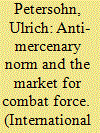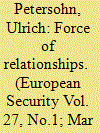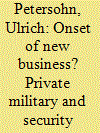|
|
|
Sort Order |
|
|
|
Items / Page
|
|
|
|
|
|
|
| Srl | Item |
| 1 |
ID:
178326


|
|
|
|
|
| Summary/Abstract |
Since 2013, combat services have been increasingly exchanged on the market. This development is puzzling since the practice emerged despite an anti-mercenary norm banning such services, and without any revision of the norm. The article argues that the combat market is not a deliberate design, but the result of strategic interaction. For some, compliance with the anti-mercenary norm is the best strategy, while for others, violating the norm is best. However, once the norm violation occurs, it is in the interest of all actors to maintain a façade of compliance. Non-compliant actors benefit from the combat services, and compliant actors do not have to engage in costly sanctioning of the norm violation, and avoid the reputational costs associated with non-enforcement. The article employs game theory to investigate the strategic interactions of actors across eleven combat contracts from 2013 to 2019.
|
|
|
|
|
|
|
|
|
|
|
|
|
|
|
|
| 2 |
ID:
186331


|
|
|
|
|
| Summary/Abstract |
This article introduces the Commercial Military Actor Database (CMAD), a dataset able to support research on civil war and commercial military actors. First, the CMAD covers all civil wars from 1980 to 2016 across all of the world’s regions except Europe, which enables the investigation of long-term regional and global trends. Second, the CMAD encompasses the corporate market segment and mercenary outfits, which facilitates the analysis of how those actors have impacted conflicts differently. Third, containing detailed information about the relationships behind exchanges, the CMAD allows users to disaggregate market exchanges. Using the CMAD’s new data, we examined trends in the market for force, and demonstrate the data’s added value. We re-examining Akcinaroglu and Radziszewski’s study on how private military and security companies affect the duration of civil war. The findings show that the market’s influence on conflict can only be fully understood by including corporate and mercenary actors.
|
|
|
|
|
|
|
|
|
|
|
|
|
|
|
|
| 3 |
ID:
158115


|
|
|
|
|
| Summary/Abstract |
Since the 1990s, military support and security services in hostile environments have been increasingly traded on the market for force. Surprisingly, how exchange is organised on the market for force remains predominantly focused on the neoclassical model, which assumes anonymous exchange, and sellers compete through price and quality of product for customers. However, the model seems to be incomplete as it describes some empirical patterns, yet not others. Why are service backgrounds clustered together and why do specific nationalities dominate the market in the Iraq and Afghanistan war? Why are they not distributed evenly as price and quality competition would suggest? The argument here is that social factors need to be taken in to account, i.e. personal relationships. The logic being that sellers and customers trade through existing relationships, and familiarity is the dealmaker, rather than price. The article takes on the challenge to develop a sociological conceptualisation of the market able to integrate both logics. Finally, the approach is put to the test on the labour market for Western security operators. The results demonstrate that personal relationships play a significant role to explain exchange on the market for force, yet co-existence with the neoclassical logic.
|
|
|
|
|
|
|
|
|
|
|
|
|
|
|
|
| 4 |
ID:
181959


|
|
|
|
|
| Summary/Abstract |
The aim of this investigation is to answer the crucial question of whether private military and security companies (PMSCs) affect conflict onset. It draws on the recently released Private Security Events Database, containing data on PMSC-related events across Latin America, Africa, and Southeast Asia. Employing a Cox Proportional Hazard model, the article explores whether the presence of PMSCs, the duration of PMSC presence, the type of service provided, and the number and type of clients affect conflict onset. Overall, the presence of PMSCs increases the likelihood of conflict onset, although its substantial effect was slight.
|
|
|
|
|
|
|
|
|
|
|
|
|
|
|
|
| 5 |
ID:
188319


|
|
|
|
|
| Summary/Abstract |
This article suggests based on the case study of the United Arab Emirates (UAE) that mercenaries as commercial surrogates can become an integral part of an overall effort of military transformation helping regimes in the Middle East to increase military capacity and capability on the battlefield. As the most assertive Arab state post-Arab Spring, the UAE arguably shows the greatest discrepancy between ambitiousness of its strategic objectives and available in-house capacity and capability among states in the region. Consequently, despite its ongoing military transformation, the Emirates more than any other Arab state had to inevitably draw on external surrogates to maintain their military presence in Somalia, Yemen, and Libya. Thereby, the case study of the UAE is quite exceptional in the region, as it has set a new trend for the commercialization of military services at the higher end of the military spectrum when translating capital into military capability and capacity. This in turn confronts Abu Dhabi’s western partners with difficult choices as they rely increasingly on the UAE to bear the burden of conflict in the region.
|
|
|
|
|
|
|
|
|
|
|
|
|
|
|
|
|
|
|
|
|